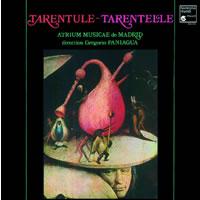Another Harmonia Mundi Classic Reissued For NextGen Analog Fans!
A collection of mostly 17th and 18th century music, much of which was written to alleviate a form of madness caused by a Tarantula bite might not sound like an enticing concept, but it is!
This collection of mostly ancient, anonymous tunes compiled, arranged and generally brought back to life by Gregorio Paniagua and performed brilliantly by Atrium Musicae De Madrid recorded and issued by Harmonia Mundi in 1976 became a big hit in the audiophile community of the time, thanks both to the music’s charm, and the stupendously natural recording.
Never mind that being bitten by the spider, while painful, caused no such condition (called “Tarantism”). It was a popular affliction of the time, and in fact, according to the notes, outbreaks of “wild dancing” date back to the 10th century.
In the Taranto region of Italy the dance designed to cure “Tarantism” was called the “Tarantella.” In the end, the liner notes say, all of the outbreaks of wild dancing that occurred in Italy, Germany, Spain and throughout the Mediterranean region were the result of “…a collective neurosis and hysterical reactions of revolt against the repression of the libido.” Sort of like what passes for political conservatism today! Ah, but I kid my right-wing friends.
Some of this sounds like English court music of the High Renaissance having nothing to do with spider bites as found on the Archiv recording Dances of Terpsichore (198166) reissued by Speakers Corner and highly recommended (in fact one selection is by Michael Praetorius one of the three composers contributing to that record.
Another selection, Francois Couperin’s delightful harpsichord piece “Les Barricades Mysterieuses,” which is about the deflowering of a young maiden, is definitely not about a spider bite, but no doubt wild dancing ensued after the act! I first heard it on a Couperin 3 LP Vox Box harpsichord collection recommended to me back in 1969 played by Alan Curtis (SVBX 5448). Couperin was court musician to Louis XIV during his later, declining years.
But back to spider bite music! The music is from Spain, Italy, Scotland, England, and France (Couperin) and played on harpsichord, lute, viola de gamba, harp, timbales and the usual assortment of ancient percussion (including a Jew’s harp). When you hear “La Tarantella” written by Gaspar Sanz in 1674 you will hear its remarkable similarity to the Peruvian pan flute music of the Incas. The album ends with a simmering Flamenco-style guitar solo by the composer.
A charming, eclectic collection of music, superbly and intimately recorded, with great transient clarity and transparency, finely textured and cleanly rendered, when you hear this, you’ll understand why it was so popular among audiophiles “back in the day.”
The sound on this reissue is spectacular and while I have an original here somewhere, I can’t find it right now….also worth looking for is
I don’t care what kind of music you’re normally fixated upon, this record will have you coming back again and again both for the musical relief it brings, and the enveloping sonics.



